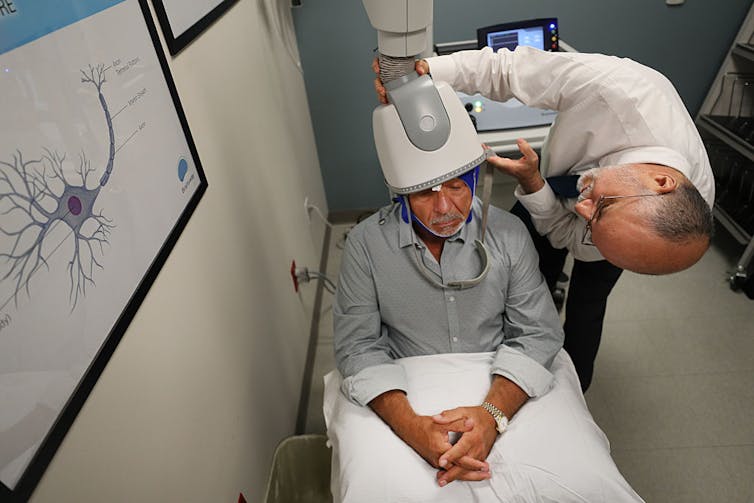Connecting state and local government leaders
The technique has the potential to treat a wide range of neurological diseases.
The connections between the neurons in your brain enable you to do amazing things, from brushing your teeth to solving calculus equations. When these connections become damaged, often as a result of conditions like stroke or traumatic brain injury, these abilities can be lost. Directly activating neurons with tiny pulses of electricity, however, can help rewire these connections and potentially restore function.
Doctors currently use this technique, called neurostimulation, to treat conditions like Parkinson’s and depression. We believe that neurostimulation has the potential to not only treat symptoms but also cure a wider range of diseases by repairing damaged connections. However, it has been unclear how to best fine-tune stimulation to specifically target damaged connections within the brain.
New forms of neurotechnology and statistical modeling that have developed over the past few years have made answering this question possible. Our team of biomedical engineers and statisticians used these tools to show that the changes neurostimulation makes to neurons depend on how they were connected in the first place. In other words, for neurostimulation to work, it needs to be tailored to each individual’s brain.
New technologies shine a light on stimulation
To investigate what factors most strongly influence the effects of neurostimulation, we stimulated the brains of two monkeys and recorded how the connections between different regions changed. We focused on brain regions involved in motor movement and sensory processing – areas that are often impaired in neurological disorders like stroke.
We recorded our data with a large-scale neural interface – a device that rests directly on the surface of a live brain and records the activity of the neurons below it. Our neural interface was able to precisely stimulate each area through optogenetics, a technique that shines a light on genetically modified neurons to activate them. While not yet approved for use in people, optogenetics has unique advantages over other forms of neurostimulation that make it especially useful for understanding how stimulation affects the brain. This includes its ability to make higher-quality recording of the electrical signals generated by the brain.
We then analyzed our data with an artificial intelligence algorithm designed to predict how preexisting brain connections and different stimulation parameters will affect the brain.
This algorithm is similar to other AI techniques like deep learning that find complex relationships in data that are otherwise difficult or impossible to identify. But unlike these “black box” models that make it impossible for researchers to understand how they arrived at their findings, our technique allows us to see why and how it makes its predictions. Using this algorithm, we were able to test different factors that influence connection changes and visualize how they each contributed to the overall prediction the model provided. These factors included pauses between stimulation sessions, the distance between stimulation locations in the brain and the region of the brain in which the electrodes were placed, among others.
We found that it was the existing connections in the brain, not how the stimulation was delivered, that was the most important factor to predicting changes in the brain. What this suggests is that the unique qualities of each individual’s brain are crucial to understand how it will respond to stimulation, pointing to a need for treatment personalization to maximize its benefits. This could look like tailoring the strength, frequency and location of the neurostimulation to each person’s brain.
Why personalization matters
Brain stimulation has the potential to treat a wide range of neurological diseases. Our work suggests that studying how existing brain connectivity affects neurostimulation response may be a new direction worth further investigation. We believe that changing neural connections themselves for long-term effects, as opposed to stimulating neurons for short-term changes in neural activity, may help move treatments from just treating symptoms to curing diseases outright.
One health condition for which personalization could lead to improved brain stimulation therapies is stroke, one of the leading causes of serious long-term disability and death in the U.S. While the brain is able to partially repair the damage caused by stroke, it has only a two-week window to do this before the chances of recovery significantly drop off.

A failed 2008 clinical study one of us was involved with, the Everest trial, explored the possibility of using brain stimulation to extend this recovery period and help stroke survivors regain their ability to move. Based on our recent study, we hypothesize that the clinical trial may have failed because researchers applied the same generic stimulation to all patients instead of tailoring it to each individual brain. Applying the same brain stimulation parameters may have worked in rodent studies, but human brains are much more complex. While we can’t know for sure if this is the reason the clinical trial failed, our research suggests that stimulation may have needed to be much more personalized to be effective.
Next steps to personalizing brain stimulation
Our work shows that tailoring treatment to each individual brain could help improve brain stimulation outcomes, and puts forward tools to study how neural connectivity influences stimulation. But further research is needed to figure out how personalization would best be done by precisely strengthening or weakening specific neural connections.
It is also worth noting that we have tested our technique on only two brain regions thus far. We plan on replicating this study in other brain regions to verify that our findings can be generalized across the brain as a whole and are applicable to different neurological and psychiatric disorders. We are also in the process of using our neural interface and AI algorithm to design stimulation patterns that can induce specific changes in the brain to repair dysfunctional connections.
The full potential of brain stimulation will not be realized until scientists have a better understanding of how it affects the brain. We believe that figuring out how existing patterns of brain connectivity interact and change with stimulation could open doors to more treatments and therapies for neurological and psychiatric diseases.
![]()
Azadeh Yazdan-Shahmorad, Assistant Professor of Bioengineering, and Electrical and Computer Engineering, University of Washington; Alec Greaves-Tunnell, Visiting Researcher in Computational Neuroscience, University of Washington, and Julien Bloch, PhD Candidate in Neural Engineering, University of Washington
This article is republished from The Conversation under a Creative Commons license. Read the original article.



